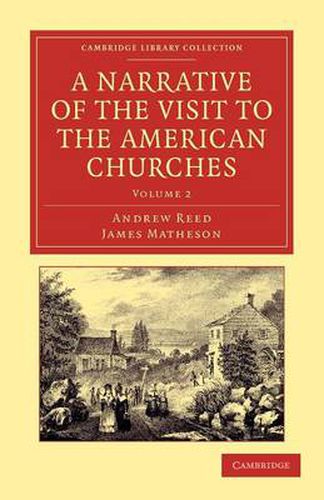Readings Newsletter
Become a Readings Member to make your shopping experience even easier.
Sign in or sign up for free!
You’re not far away from qualifying for FREE standard shipping within Australia
You’ve qualified for FREE standard shipping within Australia
The cart is loading…






Andrew Reed (1787-1862) was a Congregational Minister and one of the leading philanthropists of his day, fund-raising for and founding a number of orphanages and asylums. In 1834, he and fellow Congregational Minister James Matheson (1766-1840) were sent to the Congregational churches of the United States, in order to promote peace and friendship between the two communities. This two-volume 1835 work consists of thirty-nine letters in which the authors recount their journey, and their meetings with their fellow Congregationalists. They visited a large number of cities, mostly on the Eastern Seaboard, and made one excursion to Canada. Volume 2 tells of the many different communities that Reed and Matheson encounter in America, and the focus is mostly on theological and educational issues. They approve of female academies, asking rhetorically, ‘why should not our daughters, equally with our sons, possess the advantages, which these institutions … so readily supply?’.
$9.00 standard shipping within Australia
FREE standard shipping within Australia for orders over $100.00
Express & International shipping calculated at checkout
Andrew Reed (1787-1862) was a Congregational Minister and one of the leading philanthropists of his day, fund-raising for and founding a number of orphanages and asylums. In 1834, he and fellow Congregational Minister James Matheson (1766-1840) were sent to the Congregational churches of the United States, in order to promote peace and friendship between the two communities. This two-volume 1835 work consists of thirty-nine letters in which the authors recount their journey, and their meetings with their fellow Congregationalists. They visited a large number of cities, mostly on the Eastern Seaboard, and made one excursion to Canada. Volume 2 tells of the many different communities that Reed and Matheson encounter in America, and the focus is mostly on theological and educational issues. They approve of female academies, asking rhetorically, ‘why should not our daughters, equally with our sons, possess the advantages, which these institutions … so readily supply?’.